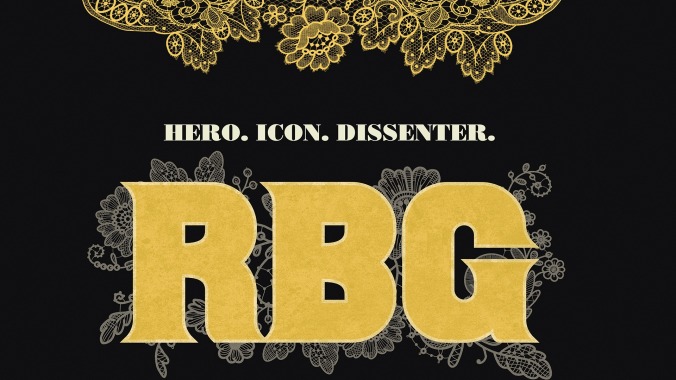RBG makes an unconvincing case for the Supreme Court’s most memed Justice, Ruth Bader Ginsburg

Is the subject of RBG Ruth Bader Ginsburg the centrist 85-year-old Supreme Court Justice, the feminist lawyer, or the liberal-moderate meme? The truth is that it’s a bit about all three, though no topic gets more than a cursory overview in Julie Cohen and Betsy West’s breathlessly superficial, school-presentation-ish documentary. We see Ginsburg working out in her “Super Diva” sweatshirt (she apparently owns several) in a cutesy rap montage and showing off the slightly flamboyant lace and beaded collars that she wears with her Supreme Court robe in place of the traditional tie; watch the opera-loving Justice fulfill a lifelong dream by taking on a non-singing role on an opening night at the Washington National Opera; hear about the highlights of her career in murky summaries illustrated with old photos, lackluster animated text, and footage of empty courtrooms. The approach is a potpourri of second-rate documentary styles, and it doesn’t exactly make for a rousing appraisal of Ginsburg’s moderate record as the stuff of radical sainthood. Centrism is still centrism, even when it’s dressed up with “Yas Queen”s and fire emojis.
Not that there isn’t a through-line in Ginsburg’s transformation from a lawyer with a knack for arguing gender discrimination cases before the all-male Supreme Court in the 1970s (part of the strategy involved male clients, as in Weinberger V. Wiesenfeld and Califano V. Goldfarb, both in defense of widowers who had been denied Social Security survivors’ benefits) into a cautious liberal-leaning justice. Presumably, some part of this story happened during the 13 years she spent as a federal appellate court judge. But since this long episode of her career isn’t part of the Ginsburg legend, it is almost completely glossed over in RBG; Cohen and West make much of her appointment to the DC Circuit before skipping straight to her nomination for the Supreme Court. This is a general problem with the film, which attempts to cover as much of Ginsburg’s career, public image, and family life as it can, but leaves the subject matter frustratingly unexamined—whether it’s her position on issues other than gender equality (barely acknowledged) or her friendship with the late, crudely right-wing Justice Antonin Scalia.
Her stances on women’s rights made Ginsburg a vilified figure for right-wing talk radio (RBG even opens with an audio montage of epithets) and, later, a liberal pop culture figure. There’s a reason, however, that Ginsburg’s dissenting opinions in high-profile Supreme Court decisions like Bush V. Gore and Burwell V. Hobby Lobby Stores, Inc. are much better known than her majorities; her judicial stance has always been that of a pragmatist, a moderate, and a middle-of-the-road Democrat. There are moments in RBG that offer fleeting insights into Ginsburg’s thinking as a legal strategist and a jurist—mostly its short interviews with Stephen Wiesenfeld, who was her client in Weinberger V. Wiesenfeld, and with Ted Olson, the future solicitor general who unsuccessfully argued on behalf of the then-all-male Virginia Military Institute in United States V. Virginia. But like all of the talking heads in RBG—which range from Bill Clinton to the co-author of the slacktivist hagiography Notorious RBG: The Life And Times Of Ruth Bader Ginsburg—these end up as generic testimonials to Ginsburg’s brilliance. The worst we hear—repeatedly—is that the octogenarian justice is a terrible cook. Of course, criticism would run contrary to RBG’s lionizing, one-sided objective. But considering that a large part of this scattered, lightweight documentary is taken up with dry biographical bullet points, it doesn’t make a winning case, either.